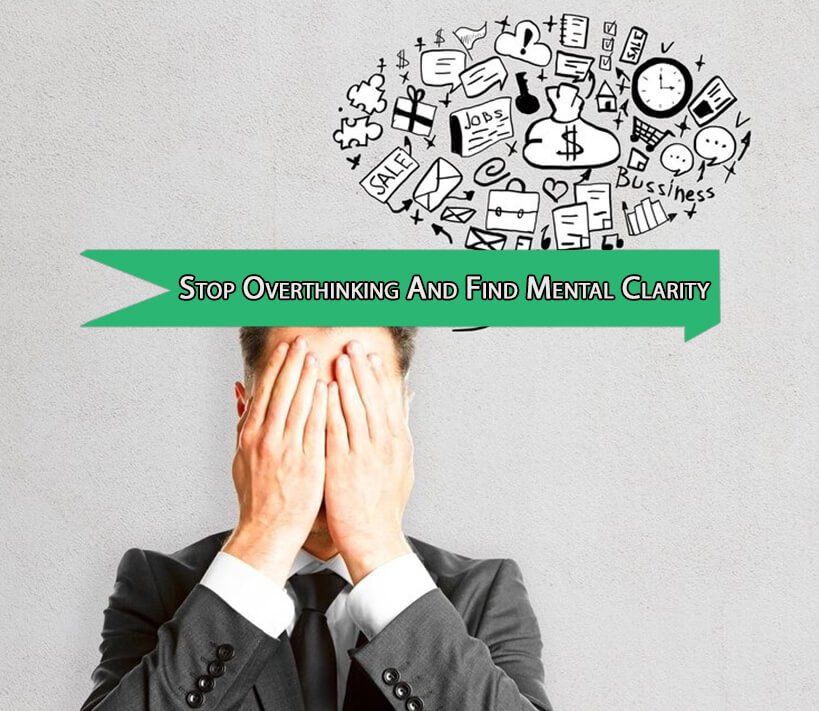Overthinking is a common mental habit that many people struggle with, and it can significantly impact mental well-being, productivity, and decision-making. Studies show that approximately 73% of people experience overthinking regularly, and notably, 69% of them admit that it negatively affects their mental health. When we overthink, our minds become overloaded with unnecessary thoughts, often about things beyond our control. As a result, this leads to stress, anxiety, and indecision. To stop overthinking and find mental clarity, it is essential to address these thought patterns and regain focus.
Overthinking can trap us in a cycle of worry and doubt, preventing us from focusing on the present and making clear decisions. This blog offers some practical strategies to help you stop overthinking and find mental clarity, regain control of your thoughts, and create a more balanced, peaceful mindset. By incorporating these techniques into your daily routine, you can break free from the overwhelming grip of overthinking and enjoy more clarity in your life.
Effective Practical Strategies to Overcome Overthinking
Stay in the Present
People often overthink unnecessary things that have no connection to reality, which leads to unnecessary stress. To stop overthinking and find mental clarity, focusing on the important matters at hand and improving them helps avoid overthinking. Overthinking is like the burning of firewood; too much thinking harms the individual and those around them. Additionally, people tend to overthink about their past or future instead of focusing on the present. This approach can significantly reduce overthinking.
Divert Your Mind
Diverting your mind is a powerful technique to break free from the cycle of overthinking. Our thoughts, often disconnected from reality, can clutter our minds and lead to unnecessary stress. These thoughts, which do not serve a purpose, can be distracting and limiting. Whenever you catch yourself spiraling into these irrelevant thought patterns, consciously shift focus to something else, whether it is a physical activity, creative task, or even mindfulness practice like deep breathing or focusing on your senses. Overcoming overthinking involves understanding that not every thought deserves your attention. By creating mental space through intentional distractions and positive habits, you allowed yourself to cultivate a calmer, more focused mind.
Spend Time in Nature
Do not panic or stress about past mistakes. Try to move forward and focus on the present moment. Learn from your Mistakes and view them as opportunities to grow. Spend time in nature. Being in nature helps you feel more relaxed and calm. Nature has a therapeutic effect that can clear your mind and reduce the psychoaura of stress, helping to calm your senses and enhance your mental peace.
Offer Prayers
Prayer keeps you away from unnecessary thinking and helps maintain a positive mindset. They offer a moment of stillness and reflection, allowing you to disconnect from the constant stream of thoughts and focus on the present. Engaging in regular prayer can provide a sense of peace and calm, reducing the tendency to overthink. By taking time to focus on your spiritual connection, you are reminded to trust the process of life and surrender control over things beyond your power. This practice not only strengthens your faith but also nurtures mental clarity, helping you remain grounded and focused. Making prayer a part of your daily routine can significantly reduce anxiety and prevent your mind from becoming overwhelmed with worries about the past or future.
Set Time Limits For Decision-making
Instead of endlessly pondering a decision, set a specific time frame for making it. This helps avoid overanalyzing and creates a sense of urgency to move forward. By creating a deadline and trusting your instincts, which can reduce the pressure of needing to find the perfect choice, and also if you are feeling overwhelmed, break down the decision into smaller, more manageable parts, and evaluate each individually. This reduces the feeling of being trapped by a single large decision and allows you to focus on what is most important. Overcoming overthinking can also be aided by reminding yourself that no decision is entirely permanent, most choices can be adjusted or improved later if needed.
Write Your Thoughts Down
Journaling can help you get your thoughts out of your head and onto paper. This process can help clarify your feelings, reduce mental overload, and allow you to look at your concerns from a different perspective. Writing not only organizes your thoughts but also provides a safe space to express emotions that might otherwise stay bottled up. It helps you track patterns in your thinking, making it easier to identify recurring worries and break the cycle of overthinking.
Learn to Accept Uncertainty
Understand that not everything can be controlled or predicted. Embracing uncertainty helps you stop overthinking situations beyond your control. By accepting that life is inherently unpredictable, you can focus on what you can control, thus reducing the pressure to have all the answers. Moreover, recognizing that uncertainty often signals growth and opportunity allows you to shift your perspective. Instead of fixating on potential outcomes, adopt a mindset of curiosity and flexibility, enabling you to adapt as circumstances unfold. This acceptance of the unknown not only frees up mental energy but also reduces stress, empowering you to take decisive action without being bogged down by endless analysis.




